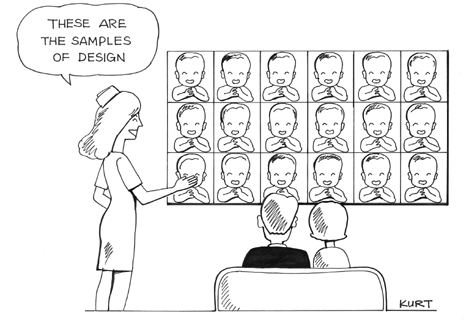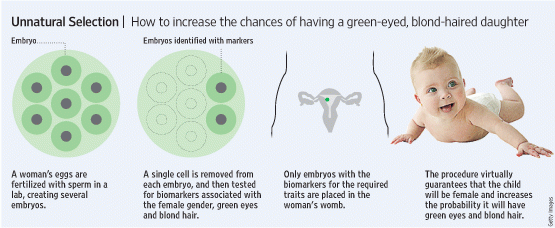Chennai Couple wants IITian Sperms for a Designer Baby: A Debate
Recently, a couple in Chennai came out with an advertisementlooking for sperms of an ex-IITian for a baby. The advertisement went:
“Ideal candidate(s) should be IIT students, healthy, no bad habits, tall and fair if possible, but will consider the right donor regardless of looks, etc. Compensation is Rs 20,000 cash. Call or email ASAP. Please help us start a family filled with love and prosperity. References will be required and checked.”
The couple wanted the following traits:
Tall
Fair
IIT-ian-esque intelligence (assuming IITians are overall intelligent by default, and not merely autistic)
Good looks (negotiable)
Designer Babies have been around for centuries. Indeed millenia! The story of Ravana’s birth in Ramayana is a good example.
Historical Designer Baby – Ravana
The Asuras (demon-like human) were trying their best to annex the land and kingdoms of the Devas (Divinity oriented humans), but could not make progress due to lack of intelligence. So, they came up with a generational plan. The headman of the tribe of Asuras had a beautiful daughter who was sent to seduce a Rishi – a Yogi and a learned being. She does seduce him and both marry. Eventually they have a son, who is Ravana. The Asura tribe takes Ravana away after the Vedic and Spiritual education under the Rishi and brings him up as an Asura. With the ruthlessness of an Asura combined with the Intelligence of a Rishi, the kid Ravana grew up into a feared Demon. One who spared none.
The story is a good reminder that Intelligence should belong to a being who is naturally inclined to protect it as well. One, who cannot handle the intelligence will completely misuse it. Often to devastating result.
LA Clinic offers Custom Babies
A few years back a Los Angeles Clinic offered a procedure known as pre-implantation genetic diagnosis (PGD), which can be used to “customize” one’s progeny. So, people could ask for a blonde, green eyed, fair skinned daughter. The clinic called “Fertility Institutes” – even got some responses for that service. Now, there is a newer version of the process called Preimplantation Genetic Haplotyping (PGH). (For Further Reading look up – Center for Genetics and Society)
But there was a huge protest against that service and with credible reasons.
“If we’re going to produce children who are claimed to be superior because of their particular genes, we risk introducing new sources of discrimination” in society, says Marcy Darnovsky, associate executive director of the Center for Genetics and Society, a nonprofit public interest group in Oakland, Calif.
Laws in Countries on Sex Selection
Apart from the ethics and the other issues surrounding this, there are legal issues about the issue of “Sex Selection”. Here are laws in a few countries on this topic:
United Kingdom
British law says that parents are only able to select the sex of their child if there is a substantial risk that a gender-related genetic disease could be passed on. ‘Family balancing’, where the reasons for sex selection are social rather than medical, is not allowed at licensed clinics in the UK. However, private, unlicensed clinics are not breaking the law by offering sperm sorting.
Denmark
The national Danish law on sex selection came into force in June 1997. The law says, that the sex of the child cannot be chosen, unless it is done to prevent a serious gender-related hereditary disease.
Finland
At present, there are no specific regulations concerning the selection of sex. A fertility treatment law is being discussed in Parliament in 2002. The law will include regulations about sex selection for gender-related hereditary diseases or other medical factors.
France
In France, there are no explicit regulations concerning the selection of sex.
However, the law does permit a therapeutic abortion if a couple has a high risk of having a child with a gender-linked genetic disorder. This would apply to gender-linked disorders such as haemophilia. Although the gene is carried by females, the disease only shows in males.
Germany
In Germany, selecting an already existing embryo for its gender is prohibited by the ‘Embryonenschutzgesetz’ (‘Law Protecting the Embryo’). This law applies even if the intention is to prevent a life-threatening disease.
Selecting the sex of your child by selecting particular sperm with which to fertilise an egg is also illegal, except to prevent a few special, very serious gender-related genetic diseases (e.g. Muscular Dystrophy). This applies whether sperm are used for IVF or artificial insemination.
Italy
To avoid a disequilibrium in the number of babies of a specific gender, sex selection of embryos is not legal. However, it is allowed if the embryo is at risk of sex-linked pathologies.
In fact, if the father suffers from a hereditary pathology linked to his sex, that is linked to his chromosome Y, the physician has to select healthy spermatozoa containing only the chromosome X, avoiding those that contain the chromosome Y.
Portugal
In Portugal, the Convention on Human Rights and Biomedicine (Oviedo Convention) came into force in December 2001. Article 14 of the Convention explicitly prohibits the use of medically assisted procreation techniques for the purpose of choosing a future child’s sex, except where serious hereditary sex-related diseases are to be avoided.
Spain
In Spain, sex selection is only allowed for therapeutic reasons to avoid a gender-related disease. The ‘Sentencia de Mataró’ court case denied a mother with four sons the legal right to choose to have a baby daughter. This was one of a few judicial cases that applied to Law 35/ 1988 regarding human assisted reproduction techniques. At its time (1988), this law was innovative on a world scale and still enjoys wide social consensus. However, 14 years after its publication, some aspects of the law need revising.
European Union
There is no such thing as a European law on designing babies. The closest we can get to a general consensus is the Convention on Human Rights and Biomedicine of 1997, which forbids sex selection except for therapeutic reasons (article 14). The same recommendation is also given by several Ethics Committees at a European level. However, the Convention must be ratified by national Parliaments before it has the force of law in member states and this did not happen. Germany, Ireland and the UK did not sign or ratify it. Italy signed but did not ratify the Convention.
There are no EU directives concerning designing babies. However, the directive concerning the legal protection of biotechnological inventions (directive 98/44/EC, 6 July 1998) is sometimes used as an argument against any genetic modification.
Love for Customized Baby
It is interesting and at the same time, ugliness that people are seeking to take their love for toys to their biological life. Not content with the right doll or gadget, they want to even customize and get the right combination in a baby. Such parents will never know love ever. For, such emotions in their case comes with qualifications. Even before the kid is born, they have decided what they like and what they don’t. Which essentially means that if a baby was born without the customized features, despite the money spent (Rs 20,000 in case of Chennai Couple), then would it mean that they will withold their love? Probably.
The designer baby “movement” will only get uglier with more advances in science. For, if you can order your “Just in Time” and “Customized” baby – like some order their cars now, then do you think people will stop at anything?
This could lead to a new type of apatheid and caste system, where the rich will create a community of tall, fair, blue eyed, blonde haired, and above-normal intelligent “special class”. Those without money will be a large outcaste society of the exact opposite.





